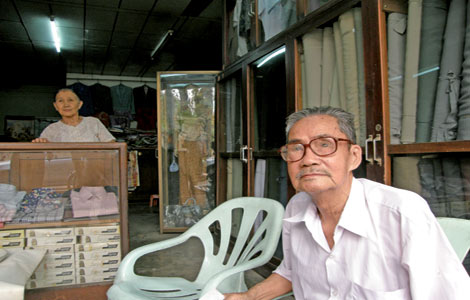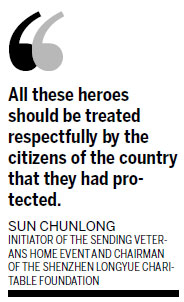Building monuments for veterans in WWII
Updated: 2012-04-10 08:08
By Cui Haipei (China Daily)
|
||||||||
|
 Zhang Jiachang, a veteran of the Chinese Expeditionary Force, who changed his Chinese name and married a local woman, now lives in Mandalay, Myanmar. Provided to China Daily |
|
|
The Chinese Expeditionary Force played a key role in the resistance against Japanese forces in Myanmar during World War II. But with more CEF veterans dying every year, fewer and fewer people remain to share their story.
To preserve the memory of their contributions and realize the long-cherished wishes of overseas Chinese, joint efforts should be made to build more commemorative monuments as soon as possible to honor the CEF, a senior Chinese diplomat in Myanmar said.
The CEF went to Myanmar twice between 1942 and 1945, and made great contributions in the fight against Japanese invaders, said Li Junhua, Chinese ambassador to Myanmar.
Li made the remarks at a recent symposium with representatives of overseas Chinese in Myanmar to commemorate the 70th anniversary of the CEF's first deployment to the country, Xinhua News Agency reported.
The monuments would not only highlight China's contribution to the resistance against Japanese aggression, but also teach younger generations to cherish peace and spread fraternity, Xinhua quoted Li as saying.
Jiang Yongren, a researcher with Peking University, said Li's proposal is a good thing, and would also further deepen the ties between China and Myanmar.
Dai Chengdong, the youngest son of the famous general Dai Anlan and former deputy head of the United Front Work Department in Jiangsu, was invited to the symposium.
"We all want permanent peace for our offspring," the 71-year-old man said.
Dispatched by the Kuomintang government, the CEF joined British and United States forces to resist Japan's military advances in southwestern China and northern Myanmar.
General Dai, commander of the famous Battle of Toungoo, led the 200th Division and blocked the Japanese army for 10 days, killing more than 5,000 enemy soldiers and earning the first big victory over Japanese forces. The CEF dealt a heavy blow to the Japanese army, and provided an inspiration to Asian people in the anti-fascist war, he said.
After the war, the Japanese built many monuments in Myanmar to honor their war horses, but the Chinese have only one monument dedicated to the CEF in Toungoo, Dai said, adding that he would like to have a monument in the place where his father died.
As of the end of 2011, there were only 15 CEF veterans in Myanmar still living, according to Xinhua.
"The CEF is of great importance to the victory over Japanese aggressors, and old soldiers never die," Dai said.
Sun Chunlong, initiator of the Sending Veterans Home Event and chairman of the Shenzhen Longyue Charitable Foundation, said on his micro blog that his organization fully supports the construction of a monument to honor the contributions of the CEF.
When the Myanmar government set off a wave of anti-Chinese policies in the 1960s, many monuments and graveyards of the CEF were destroyed, and the Japanese began to build new ones in the 1970s.
"We are far behind in this regard," Sun said.
Sun, a former assistant editor for Oriental Outlook magazine, has helped 30 CEF veterans who lived in exile in Myanmar after World War II return home. There are more than 1,000 volunteers in China who are still trying to bring CEF veterans back home.
In 2005, Sun met a CEF veteran named Zhang Fulin at a village in Myanmar that is part of the famous Golden Triangle. "I thought he would tell me something about opium, but he just kept talking about the CEF, which did not interest me at all," Sun said.
"I asked whether he had fought against the Japanese. The question provoked him, and he yelled, 'If we had not, how did those buried in the Anti-Japanese Memorial Park die?'"
Zhang did not seek citizenship in Myanmar because he was a Chinese soldier and planned on coming home, Sun recalled.
"As a young Chinese journalist, I felt obliged to participate in some events to help them," he said. "All these heroes should be treated respectfully by the citizens of the country that they had protected," Sun said.
After Japan surrendered in 1945, the Chinese Civil War resumed. Some veterans became stranded in foreign countries and were never able to return home.
Most veterans survived by changing their Chinese names and marrying local women, but only a few of them were given permanent residence by the Myanmar government, Sun said.
Since the CEF veterans did not understand the local language, finding a job was difficult, and many of them lived in harsh conditions.
The CEF veterans were not officially honored until 2005, when President Hu Jintao gave a speech recognizing their contributions. Some of the veterans were awarded medals.
Still, very few people know about the sacrifices these heroes made, Sun said. And with more and more veterans dieing every year, time is running out to honor them while they are still alive.
cuihaipei@chinadaily.com.cn

 Relief reaches isolated village
Relief reaches isolated village
 Rainfall poses new threats to quake-hit region
Rainfall poses new threats to quake-hit region
 Funerals begin for Boston bombing victims
Funerals begin for Boston bombing victims
 Quake takeaway from China's Air Force
Quake takeaway from China's Air Force
 Obama celebrates young inventors at science fair
Obama celebrates young inventors at science fair
 Earth Day marked around the world
Earth Day marked around the world
 Volunteer team helping students find sense of normalcy
Volunteer team helping students find sense of normalcy
 Ethnic groups quick to join rescue efforts
Ethnic groups quick to join rescue efforts
Most Viewed
Editor's Picks

|

|

|

|

|

|
Today's Top News
Health new priority for quake zone
Xi meets US top military officer
Japan's boats driven out of Diaoyu
China mulls online shopping legislation
Bird flu death toll rises to 22
Putin appoints new ambassador to China
Japanese ships blocked from Diaoyu Islands
Inspired by Guan, more Chinese pick up golf
US Weekly

|

|







